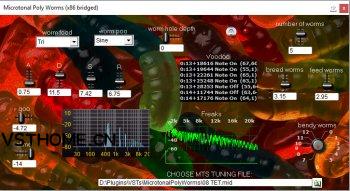24.10.2018 | x64 x86 VST WiN | 10 MB
英文简介:
Microtonal Poly Worms is a free polyphonic VST microtonal Windows synth from Michael W. Dean of the musical project, BipTunia. It has 5374 tunings (!), 64 presets. This is the easiest microtonal synth to use, ever, yet it is robust, and will give you power.
System Requirements:
Microtonal Poly Worms is a 32-bit Windows synth, but it tested fine on 64-bit Reaper (and of course also on 32-bit Reaper. It should work on any 32-bit DAW, and on many 64-bit DAWs.
Microtonal Poly Worms is a no-nonsense introduction to microtonal synthesis, It's great for heavy bass, forceful leads, crystalline chimes, and more.
Microtonal Poly Worms is fun, polyphonic, and is truly microtonal. So you can enjoy non-standard (for the West in the current year) scales and tonalities going back thousands of years, from all over the world. It also includes new tunings from the future that are the product of maths and art mating in the minds of some very smart and creative people.
Enjoy it. And tell two friends. Spread xenharmonic joy.
Microtonal Poly Worms has 32 notes of polyphony, yet very low memory usage. It also holds its scale setting in a project when you close and reopen your DAW. Not all microtonal synths do.
Each preset has a different tuning, but you can use the picker to add any of the tunings to any of the presets. You can also make your own synth patches, or add your own tunings (in MTS file format.
The order of MTS files in the presets are set up somewhat randomly, to encourage experimentation. But you can stop using the set tunings in a given preset at any time, and pick your own. You do this by clicking on the file picker near the bottom right, on the "CHOOSE MTS TUNING FILES" section at the bottom, and picking any of the other 286 scales.
The archive also includes Sevish's PDFs about many of the tunings, included at his suggestion. They are a great read. Very educational, but not at all dry.
The mod wheel function on MicrotonalPolyWorms is unique. It controls a combination of sustain, phase mod, and pulse width. It's somewhat more subtle than many expect from a usual mod wheel, but very useful in creating a shimmer or very special vibrato by hand.
The mod wheel will do more on some presets and patches than on others. And will do more in some octaves than on others.
We recommend you try patches and tunings you like in different octaves as well. And with single notes, two- and three-note chords, and also try chords with more notes.
This synth will also produce very interesting results with an arpeggiator. Try it.
The pitch wheel on your MIDI controller will control pitch. The amount you can bend with it is.
MicrotonalPolyWorms has a couple of cool frequency meters, and a MIDI control readout. These are diagnostic tools used while making a VST, but usually removed before outputting for the public. I like 'em, so left them in. They're stoney and groovy. But they also teach you a bit about how this all works, and what audio synthesis actually is.
You can also use them to see different harmonics.
Microtonal Poly Worms controls:
The two oscillators are called "worm food" and "worm poo.".
"slime" is filter resonance.
"goo" is other filter resonance.
"worm hole depth" takes one oscillator slightly out of tune for depth.
"There are two un-labeled frequency analyzers. Left one is a logarithmic frequency scale. The right one is a linear frequency scale.
"voodoo" shows fun MIDI numbers and voltages.
"ASDR" is obviously the envelope.
"worm gas" is an ASDR filter.
"breed worms" is speed of delay.
"feed worms" is feedback of delay.
"bendy worms" is amount of pitch on pitch wheel.
The unnamed switch next to the unnamed LED is TURBO. "Turbo" turns the synth up a little too loud. This can make a sort of "overdriven" sound with extra harmonics, like a loud guitar amp.
"Number of worms" is output volume. I recommend you turn this down before turning on the turbo switch.
官网: https://biptunia.com/?p=3045







评论0